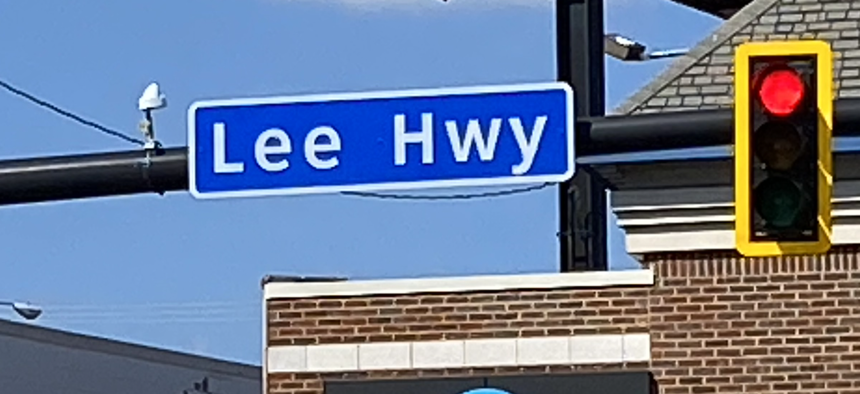One County’s Solution to Controversial Confederate Road Names: Switch to Numbers

Lee Highway in Fairfax County, Virginia. Photo: Tom Shoop
But dissenters argue it’s all part of a plot to erase their Confederate heroes from history.
Last week, the Fairfax County Board of Supervisors voted 9-1 to rename two major thoroughfares in the county, Lee Highway and Lee-Jackson Memorial Highway, to remove their association with Confederate leaders.
Their solution to the naming controversy: Switch to numbers. Pending approval by state officials, the roads will now be designated Route 29 and Route 50. Those figures match their federal highway designations.
Lee Highway consists of a 14-mile stretch of U.S. 29, split into two sections within Fairfax County. It was named after Confederate Gen. Robert E. Lee in 1919. Lee-Jackson Memorial Highway, designated for Lee and Confederate Gen. Thomas “Stonewall” Jackson, is an eight-mile long section of U.S. 50 from the city of Fairfax to the western part of the county. The road is known as Arlington Boulevard in the eastern section of the county.
The Board of Supervisors’ vote came after the changes were recommended by the county’s Confederate Names Task Force, which was created in July 2021 and issued a report at the end of that year. The switch to numbered designations for the roadways was among several options the group offered.
But while the board's vote to approve the shift to numbered roads was nearly unanimous, it masked sharply dissenting views on the task force about whether to change the highway names.
The task force’s vote on renaming Lee Highway was 20-6, and the Lee-Jackson Memorial Highway redesignation passed on a 19-6 vote, with one member abstaining.
“We knew the task of recommending alternative names…would reveal personal and emotional moments and differences of opinion,” task force chair Evelyn Spain wrote in the report.
Indeed, the six members who voted against the name changes issued lengthy dissenting statements when the task force’s report was released. They also all signed on to a letter saying, “We believe changing these road names will be divisive and ill received by a majority of those impacted while providing minimal substance to benefit the community.”
Local governments have grappled for years now with what to do with Confederate monuments and sites ranging from roads to schools to parks named for figures who fought for the South during the Civil War. These efforts took on new urgency after the killing of George Floyd by Minneapolis police in 2020 and the national reckoning over racial injustice that followed. The episode in Fairfax County is a reminder of how removing longstanding place names tied to the Confederacy remains a sensitive topic in some communities.
One criticism from the dissenters there was the task force's decision not to follow the results of a public survey on the potential change.
In the survey, 23,500 respondents backed keeping the road names the same, and 16,265 favored changing them. But Spain noted in the report that the survey was unscientific.
“There were limited controls in place to prevent people from filling out the survey multiple times and there were no restrictions that would disallow input from respondents outside of the County,” she wrote. “There was no sampling conducted to extrapolate the data to ensure it reflected the diverse population or to ensure equal representation from each magisterial district within the County.”
In their letter, the dissenters wrote that, after the Confederacy’s defeat, southerners “were desperate for something to be proud of, and this sentiment still exists today. Placing aside the politics around the war, Generals Lee and Jackson were tactically and strategically brilliant, and military academies around the world still study their campaigns.”
The dissenters went further in other papers submitted to the task force. Four of them signed on to a letter arguing that not only was Lee a figure of historical importance, but that he was still deserving of honor today, because the Union was at fault in the Civil War.
“A knowledgeable understanding of factual U.S. and civil war history leads to the perspective that R. E. Lee's and the Confederacy's military actions were undertaken to protect and defend seceded states' territory against invasion and occupation by U.S. military forces, not to wage war against the United States nor to overthrow the U.S. government.”
Technically, they wrote, Lee was not a traitor to his country, because the oath of allegiance he took as a military officer referred to the United States in a collective sense, not as an individual entity.
One of the dissenters argued that the task force’s action was part of a broader plot to “erase” the county’s southern heritage.
“Fairfax County’s race-obsessed School Board and Board of Supervisors have been on an ideological mission to purge all visible evidence of Confederate history and heritage from Fairfax County. … This misguided political policy not only divides us by race and ethnicity, it works to erase all names and landmarks of past history that ‘offend’ intolerant activist groups like the NAACP, [Black Lives Matter], and Antifa.”
If the county intends to attempt a wholesale renaming project, it will take a lot of work. In December 2020, the county’s History Commission issued a 539-page report cataloging 26,500 roads, monuments and other assets with potential links to the Confederacy.
If the state approves changing the names of Lee Highway and Lee-Jackson Memorial Highway, 230 road signs will need to be replaced, which the county estimates will cost about $1.4 million. The task force also recommended providing financial assistance to businesses along the thoroughfares that would be affected by the change, which could cost an additional $1.5 million.






